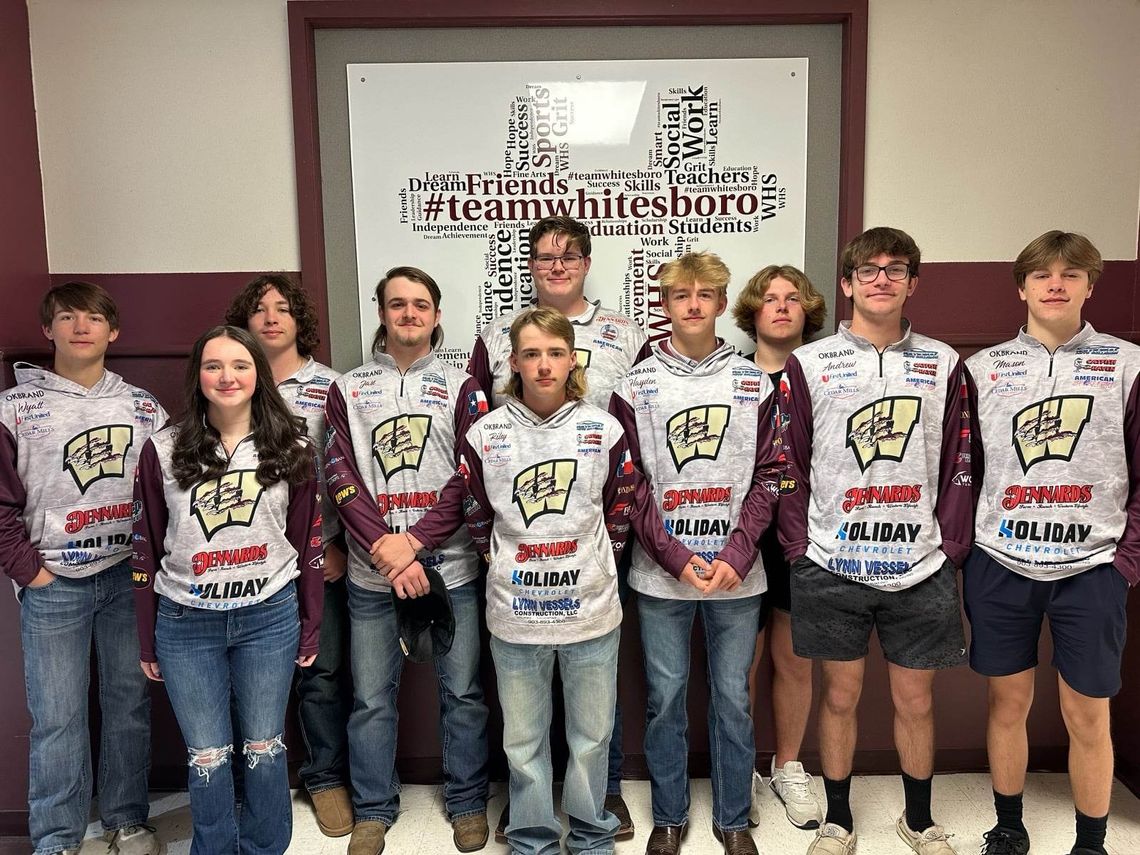The Whitesboro High School (WHS) Bass Team has four teams advancing to this year’s Texas High School Bass Association (THSBA) Regional Competition at Possum Kingdom Lake on April 20.
At its final THSBA Tournament of the regular season last week at Lake Ray Roberts, the WHS Bass Team had three of its six teams weigh-in out of 211 teams in the North Texas Division.
Wyatt St.John and Cason Vessels had a total of 10.08 lbs. and placed 10th. Adisyn Russell and Canyon Heffley had a total of 4.90 lbs. and placed 44th. Riley Quick and Jase West had a total of 3.56 lbs. and placed 58th.
The point total for the season revealed that the following teams will advance to regionals:
Wyatt St.John and Cason Vessels – 7th
Adisyn Russell and Canyon Heffley – 18th
Riley Quick and Jase West – 57th
Andrew Hollandsworth and Blake Kisselburg – 94th
Also, St.John and Vessels qualified for the THSBA Angler of the Year Tournament on June 29. They are only the second team in the history of Whitesboro’s teams to qualify.
The WHS Bass Team was formed seven years ago by Dusty Luton (current school advisor/coach), Greg Hickman and Chris Dobbs. They started the group simply because they enjoyed fishing with their sons.
“We all loved to fish, so we just did it,” Luton said.
Each year, students in grades 9-12 can sign up to join the group. Anglers can either work in teams of two or go solo, but each team must have a captain that’s an adult age 21 or older.
“We have long talks with the kids about showing appreciation to their team captains,” Luton said. “Captains often provide the boat the students use for their tournaments. They have to have liability insurance. It’s quite an investment of time, equipment and resources. We really value our captains.”
Whitesboro competes in THSBA in the North Texas Division, one of the largest in the state. Throughout the regular season, the teams compete at five tournaments at Lake Ray Roberts, Lake Texoma, Lake Ray Hubbard, Lake Lewisville and back at Lake Ray Roberts. Participants spend eight hours on the water, sending out their first cast around 6:45 a.m. and bringing lines in at 3 p.m. The goal is to catch the five heaviest large mouth, small mouth, spotted or Guadalupe bass they can hook.
The fish are kept alive all day. The anglers that have the highest weigh-in of those five fish win the tournament. There is also an award for the biggest single bass catch of the day. Once the fish have been weighed, THSBA places them all into a huge tank and they are released back into the lake.
At each of these tournaments, the top placeholders earn scholarships, which are tracked by THSBA until those students graduate high school. The top 40% of 258 teams in the North Texas, West and Metroplex divisions advance to regionals. At the regional tournament, scores are reset and the top 30% of the winners at that competition will advance to state.
This year, Whitesboro has six teams of 11 kids (with one solo teammate). The teams rely on sponsors to help them throughout the year.
“We’ve always had great support,” Luton said of the team’s sponsors. “Those funds take us through the whole year.”
Throughout the season, both at THSBA tournaments and internal competitions the Whitesboro teams hold on their own, students accumulate points. Those points are what ultimately determine the winners for the year. The season will end with an awards dinner at which they will name the Angler of the Year.
“Fishing teaches a lot of life skills,” Luton said. “You learn how to trailer a boat, how to deal with breakdowns on land and in water and the patience and possible disappointment of waiting all day and never catching a fish. This is so much more than fishing. It’s great bonding time. It’s a great sport to be out there with your kid. You’re outdoors, sometimes camping out. It’s a different kind of athletic. There are a lot of skills involved.”

